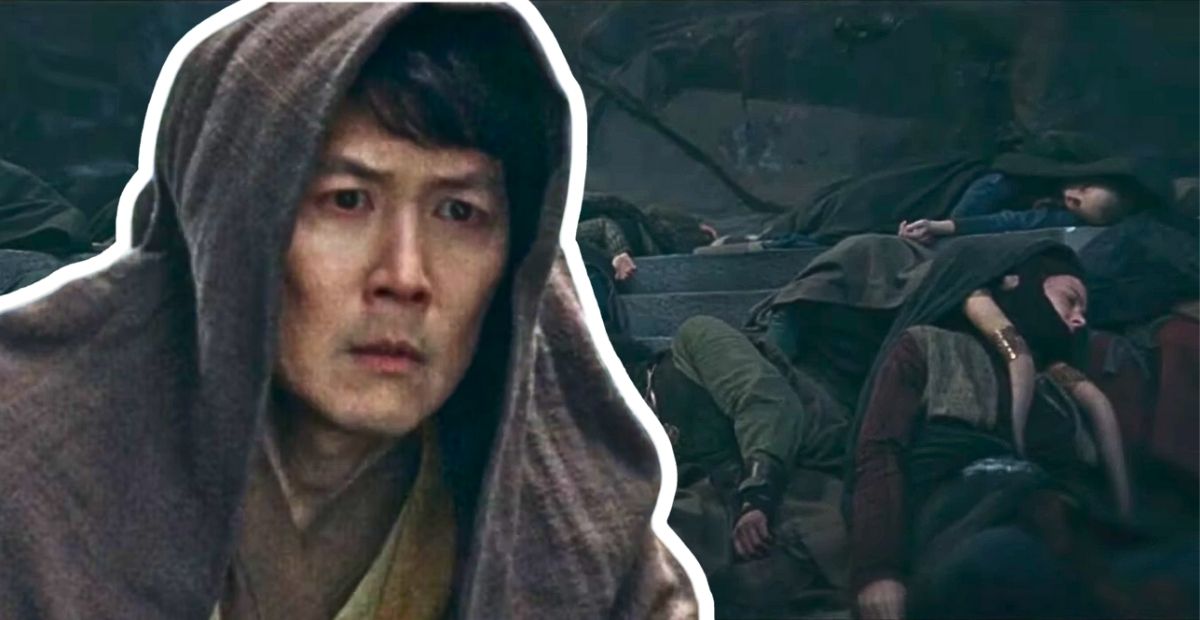In The Acolyte, the Jedi’s actions on Brendok sparked heated debate, with some fans claiming that the Jedi overstepped their boundaries.
Others argue that the Jedi acted with complete justification. So, where do we stand?
Let’s get into why the Jedi didn’t actually do anything wrong on Brendok, exploring their motives, actions, and the context behind the conflict.
1. Self-Defense Against Aggression: The Jedi Had No Choice
Let’s start with the core of the situation: the Jedi weren’t aggressors; they were responding to a direct threat.
Master Sol and his team approached the witches on Brendok peacefully. They didn’t charge in with lightsabers blazing.
In fact, when Sol and his team encountered the witches, they didn’t come in with the intention to start a fight.
But when faced with dark side rituals and physical aggression, what were the Jedi supposed to do? Stand by and let it happen?
The witches didn’t just defend themselves – they actively used dark-side magic, including mind control, to attack the Jedi.
That alone would have justified a defensive response, but the Jedi didn’t react immediately.
It wasn’t until they were met with raised weapons and aggressive dark magic that Sol finally drew his lightsaber in self-defense.
And while some might criticize Sol for killing a witch, it’s important to remember that he wasn’t attacking out of malice.
He was reacting to a real, immediate threat from a practitioner of the dark side.
In this situation, the Jedi had every reason to defend themselves. They didn’t go looking for a fight; they were protecting themselves from a group that clearly posed a danger.
2. Sol’s Concern for the Children Was Justified
A lot of the controversy comes down to Sol’s concern for the two young girls, Mae and Osha.
Critics claim that Sol acted out of misplaced fear, but was his concern really misplaced? Not at all.
Sol saw two children being prepared for what looked like a dark side ritual. He had every reason to believe they were in danger.
The witches on Brendok weren’t exactly upfront about their intentions. Sol saw the girls being treated in a way that triggered alarm bells, there was dark magic at play, and the Jedi are sworn to protect the vulnerable.
Whether the witches intended to harm or not, it was reasonable for Sol to step in. After all, his role as a Jedi is to safeguard those who can’t protect themselves, especially children.
When you’re looking at the situation through Sol’s eyes, he wasn’t wrong to be cautious. His actions were driven by genuine concern, not baseless paranoia.
3. The Coverup Was Flawed, But the Jedi’s Actions Were Not
Now, let’s address the elephant in the room: the coverup. Yes, there was a coverup after the Brendok incident, and that’s where things get murky.
But the coverup doesn’t mean the Jedi’s initial actions were wrong.
The coverup was politically motivated, meant to protect the Jedi Order from scrutiny and prevent the Senate from interfering in their affairs.
While covering up what happened might have been questionable, it doesn’t change the fact that the Jedi acted in self-defense during the actual conflict.
The issue lies with the aftermath, not the actions taken during the fight itself. Sol and his team responded to aggression in the only way they could, given the circumstances.
Opposing Viewpoint: Did the Jedi Overstep?
Now, to be fair, there are critics who argue that the Jedi shouldn’t have been involved in the first place.
They claim the Jedi were outside of the Republic’s jurisdiction and had no right to interfere with the witches’ affairs.
According to this viewpoint, Sol’s intervention was based on fear and misunderstanding, not actual danger.
There’s some validity to this argument, and after all, the Jedi do tend to act as if their moral authority outweighs legal boundaries.
But even with that in mind, it’s hard to say that the Jedi were completely out of line.
When they saw potential dark side threats and vulnerable children, they acted. Maybe they weren’t perfect, but their intentions were clear: protect and defend.

